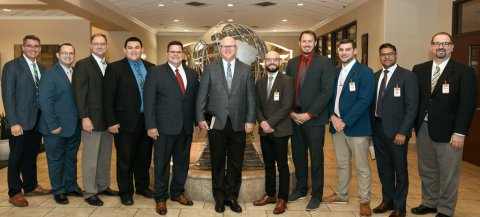Christian Living
I am just a biblical counselor.” I have heard this statement made time and again. For some reason, biblical counselors at times feel inferior to their secular counterparts.
We need not feel this way. Rather, we have every reason to be courageous in our counseling, for we approach situations with the incredible resource of the powerful, sufficient, authoritative Word of God.
Have you noticed how many people struggle with back problems? Bulging disks, muscle strain, and arthritis plague and threaten to debilitate. While multitudes flock to chiropractic care or physical therapy, this physical malady can be eclipsed by a sometimes subtle but arguably more serious back problem in the Christian school. Spineless mediocrity, antagonism, negativity, selfishness, and transience are issues of consequence. The descriptor, spineless, is intentional.
Every relationship is formed and perpetuated by an invisible link called trust. That binding link is forged through loving communication, meticulous integrity, and honest transparent motives.
Woke is an odd word—and not just because it is a past tense verb that is now commonly used as an adjective. It’s odd because it has vague connotations without clear definitions. This ambiguity allows those who appreciate the word’s implications to write off those who criticize its implications as “just not understanding its meaning.”
Here in the United States, we are blessed with an incredible level of religious liberty. But if we do not vigilantly guard this liberty, it will erode and eventually be destroyed. We must use the freedom that we have to be the salt of the earth and shine the light of truth.
Below there are five ways Christians can make a difference for Christ and stay engaged in ways that can preserve our religious liberty.
Is it not one of the great contradictions of the Christian life that we who have trusted Christ with our eternity sometimes struggle to trust Him with our money? God promises to meet our needs, and we all have testimonies of specific times and ways that He has done so. Yet, we still sometimes find a gap between wanting to trust Him with our finances and actually doing so.
So what are some of the regular financial practices that help us exercise trust in God?
Ministry is filled with unexpected moments of crisis. In these times, we find ourselves praying for God’s miraculous intervention. Throughout the New Testament, however, we see that crisis prayers are often ineffectual without being preceded by communion prayers.
1. Avoid an uncertain sound. Don’t engage in activities or associations that make your testimony for Christ unclear.
“For if the trumpet give an uncertain sound, who shall prepare himself to the battle?” (1 Corinthians 14:8).
2. Let not your good be evil spoken of. Be willing to limit your Christian liberty to avoid causing a stumbling block to others.
“Let not then your good be evil spoken of” (Romans 14:16).
Take a walk with me through what many have called “the great hall of faith”—Hebrews chapter 11. The men and women listed in this chapter are people whose lives were pivot points in Bible history.
Due to a population explosion in Southern California in the early 1920s, plans were made to create a large reservoir to help meet the region’s growing water needs. Engineer William Mulholland had achieved a great deal of recognition and respect among members of the engineering community when he supervised the design and construction of the longest aqueduct in the world at that time—the Los Angeles Aqueduct, and he was chosen as the chief engineer for the new project.
Do you ever feel forgotten by God? Do you wonder if He still knows your address? If He has a plan for your life? If He is able to help with your needs?
Do you ever feel discouraged while looking at the state of our nation? Do you wonder where the speedily declining moral degradation will end?
In short, do you wonder if God is in control?
One of the highlights to me of World Impact Missions Conference at Lancaster Baptist Church is seeing missionaries who grew up at Lancaster Baptist and/or graduated from West Coast Baptist College and and are now serving the Lord on mission fields around the world. (The picture above is of WCBC alumni who were here for Missions Conference ’23 earlier this week and are now planting churches around the world.)
From the early moments of church history, we see glimpses of the kind of leaders the Lord desires to be present within His church.
Wherefore, brethren, look ye out among you seven men of honest report, full of the Holy Ghost and wisdom, whom we may appoint over this business. (Acts 6:3)
That phrase “look ye out among you” is significant because it shows that these qualities are not to be present in pastors only but also among godly Christians within a local church family.
When I was in junior high, I had a fervent desire to become a great basketball player and one day possibly be drafted into the NBA. Now that never became a reality (not even close), but my love for the game was sincere.
Many Christians think of doctrine as irrelevant to their daily lives. They hope their pastor studies it, but they don’t think of it as having practical importance to the average Christian on a Thursday afternoon.
In reality, nothing could be further from the truth. You see, it is understanding and believing “the faith” that allows us to exercise daily faith.































